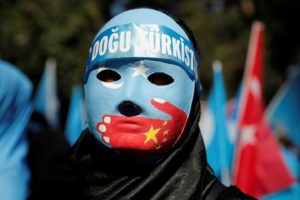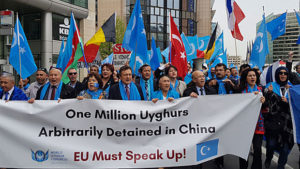Why What We Are Seeing in Xinjiang Is Crimes Against Humanity

Uighur protester outside of China with a mask with the flag of East Turkestan and a Chinese flag covering her mouth
Last week, the Washington Post published my op-ed where I argued that what is being perpetrated against Uighur and other Turkic Muslim women – rapes, forced sterilization, forced abortion – are all crimes against humanity. Since publishing that piece, many have asked why I decided to describe these acts as crimes against humanity? Why am I not calling it genocide? Or at least cultural genocide?
In the past few months, many have stated that the Chinese government’s actions in Xinjiang are akin to cultural genocide. The government’s widespread razing of mosques; its destruction of Muslim burial grounds; its prohibition against certain religious baby names; its mass internment of 1.5 million Uighurs and other Turkic Muslims for no crime other than being Muslim; all of these reflect a Chinese government intent on destroying the Uighur culture and “Sinicize” them, making it cultural genocide. But cultural genocide is not a crime under international law and thus, brings with it no legal duty for the world to stop it nor any punishment for the perpetrators. In fact, the drafters of the Genocide Convention intentionally rejected the concept. Instead, genocide under the Convention is limited to the biological or physical destruction of the group coupled with an intent to destroy. When I spoke with Deborah Mayersen, a lecturer at the University of New South Wales at the Australian Defense Force Academy and an expert in the field of genocide studies, she was clear that she didn’t think that the situation in Xinjiang was genocide. “I do think there are warning signs, but at the moment [China] is not heading toward genocide” she told me. “There would need to be some sort of disruption – an economic disruption perhaps that can be blamed on the Uighurs – for [China] to be on the trajectory toward genocide.”
“But we do have a fairly clear case of crimes against humanity” Mayersen emphasized. Unlike genocide, crimes against humanity is not governed by a specific treaty. Instead, it has developed through international customary law, with its use at Nuremberg, the International Criminal Tribunal for the former Yugoslavia, and the International Criminal Tribunal for Rwanda among other instances. Crimes against humanity include acts that attack the very soul of a people and its culture: murder, extermination, torture, arbitrary detention, forcible transfer of a population, rape, sexual violence, forced sterilizations, apartheid. It might sounds a lot like genocide, but unlike genocide, these crimes do not require an intent to biologically destroy, an element we don’t yet have in Xinjiang. Instead, acts that constitute crimes against humanity merely need to be part of a widespread or systemic attack directed at a group, with the perpetrator’s knowledge that his or her acts are part of this larger attack.
Because crimes against humanity is a legally recognized doctrine, it “brings with it the responsibility to protect” Mayersen told me, citing to a 2005 U.N. Resolution, signed by all 193 UN member states. Under that Resolution, the international community is required to take quick and decisive action to protect the targeted group.
The unlawful internment of 1.5 million Uighurs and the removal of Uighur children from their families alone constitute crimes against humanity. And rape and forced sterilization have been considered crimes against humanity for decades. Sexual violence against women was a basis for crimes against humanity at the International Criminal Tribunal (ICT) for the Former Yugoslavia and of the ICT for Rwanda. In 2013, the U.N. Human Rights Council, in its inquiry report on North Korea and after conducting a number of victim interviews, found sufficient evidence for a charge of crimes against humanity for the rape, forced abortions and sexual violence perpetrated against women.
Because there is more than sufficient evidence that what is happening in Xinjiang is crimes against humanity, activists, journalists and others must refer to it as such. Only then is the world required to act. To call it anything less gives the world a free pass and permits the Chinese government to continue to engage in its destruction of the Uighur people and their culture.
 On Facebook
On Facebook By Email
By Email 



